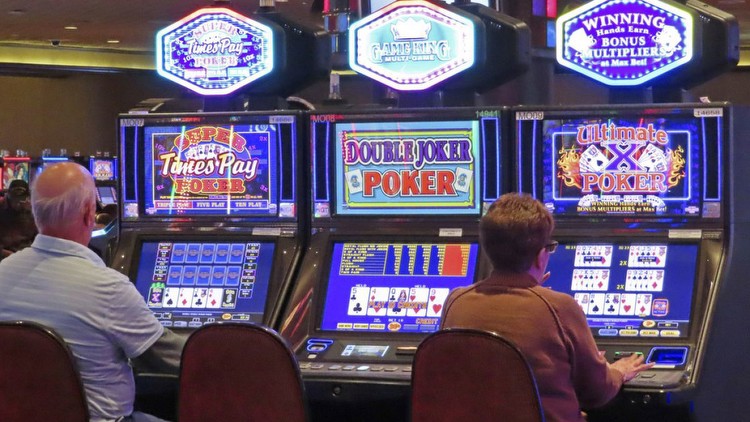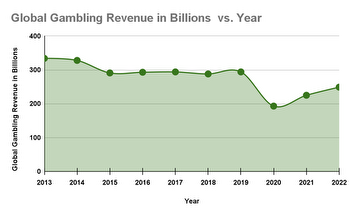UK stakes its claims to second spot in worldwide online gambling

Online gambling in the UK has risen significantly during and post-pandemic, as tax-free winnings, affordability and convenience all contribute to a surge in gambling across the UK.
The UK has bagged second spot in the top online gambling nations list in 2024, with a projected revenue of about £11.01 billion (€12.80 billion), according to Statista data about gambling revenue, compiled by the Japanese online casino guide for 61 countries.
This is just behind the US, which is expected to see about £18.41 billion in revenue this year. Australia took the third spot, with a projected revenue of £8.11 billion.
27.9% of UK consumers revealed that they had gambled online, with the country expected to see a rise of 7.4% in gambling revenues this year. However, this is projected to be the fourth-lowest gambling revenue increase this year. From 2024 to 2028, the UK is likely to see gambling revenues inch up 3.84% per year.
On the other hand, the US is expected to see a rise of approximately 20.3%, with Australia estimated to see a surge of 10.5% in gambling revenue this year, and about 5.12% annually until 2028. 21.1% of Australian consumers have also highlighted that they have already experienced online gambling.
Across the surveyed gambling nations worldwide, the jump in revenue is expected to be about 12.9%.
Japan came in at fourth place, with an estimated online gambling revenue of £4.95 billion this year, a 12.7% rise from 2023. About 7.9% of Japanese consumers are likely to gamble online this year, with 11.3 million people projected to be participating in the industry by 2028.
Emiko Matsuda, editor-in-chief of Japanese online casino guide said, in an email note, “The surge in online gambling can be attributed to a variety of factors such as the pandemic, which meant many betters transitioned from wagering on sports to online gambling, and the data suggests that this shift is permanent.”
Why is online gambling in the UK so high?
Gambling culture is deeply ingrained in the UK, with a large market for sports and online betting especially. According to YouGov’s Global Gambling Profiles data, about 49% of UK online gamblers spend more than £5 on fantasy sports and sports bets per month.
25% of online gamblers also went for slot machines, with 17% choosing casino games and 18% opting for bingo, with gamblers spending £5 and upwards for these games per month.
The lottery is also extremely popular in the UK, with Lottoland UK estimating that more than 70% of adults in the UK enter the national lottery regularly, coming up to nearly 45 million people.
However, perhaps surprisingly, football and horse-racing are not the sports that tend to see a very high amount of betting activity in the UK. Instead, sports such as cricket, tennis, boxing, rugby and golf see gamblers spend more than £200 a month, according to Global Gambling Profiles data.
Online gambling in the UK rose rapidly both during and after the pandemic, when traditional sports events such as horse racing, cricket and football faced considerable restrictions.
Now, even though these events are back to normal, the draw of online gambling still persists. This is because online gambling offers a range of advantages, such as several games and options, at the tips of gamblers’ fingers.
The convenience of online gambling means that visits to casinos are not always required, with players often able to access their favourite games from the comfort of their homes. Furthermore, gambling winnings in the UK are tax-free, which can be a major incentive for players to keep going and bet higher amounts than before, in the hopes of winning bigger.
Another reason gambling has gained a lot of popularity in the UK is due to increasing affordability, with several slot games allowing players to start with only £1. Gambling regulations in the UK have also strengthened, making several players feel much more confident spending money on various online gambling sites.
What are the dangers of online gambling?
However, online gambling still poses significant risks in some cases, not least, the possibility of addiction, bankruptcy, fraud, scams and increased substance abuse. These in turn, may also cause rising problems at work and in interpersonal relationships.
Public Policy Exchange said on its website, “The UK government estimates that 0.5% of the adult population has a problem with gambling (as many as 2.5% of people, according to a 2023 Gambling Commission survey), 3.8% are gambling at at-risk levels, and 7% are affected negatively by other people’s gambling.
“Over 420,000 people in the UK lose £2,000 or more in online gambling each year. The government’s economic analysis from 2023 estimates the direct financial cost to government associated with harmful gambling to be £412.9 million.”
To help decrease the risks of financial loss, the UK government has imposed a levy of £2 on individual stakes on online slot machines for players under 25 years old, with a limit of £5 on individual stakes for people over 25.
Charles Ritchie, co-chair of Gambling with Lives said regarding this levy, on Public Policy Exchange’s website, “If the levy is going to be effective, then it would need to deliver significantly greater funds to the treatment system. Expenditure on treatment for drug and alcohol harms are many orders of magnitude greater than what is being suggested for gambling.
“The £2 limit for under-25s is a step in the right direction, but £5 for over-25s is another missed opportunity to stop the harm to millions and the devastation caused by gambling suicides. Stake limits offer some harm reduction, but the products are still highly addictive, so we also need much slower spin speeds, affordability checks and proper public health information about the dangers.”



































